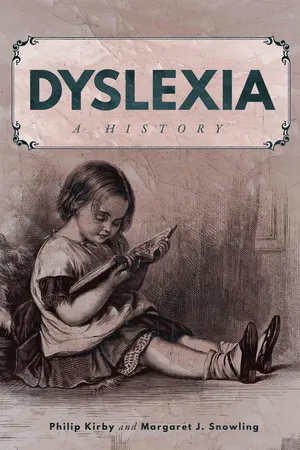
- English
- ePUB (mobile friendly)
- Available on iOS & Android
About this book
In 1896 the British physician William Pringle Morgan published an account of "Percy," a "bright and intelligent boy, quick at games, and in no way inferior to others of his age." Yet, in spite of his intelligence, Percy had great difficulty learning to read.
Percy was one of the first children to be described as having word-blindness, better known today as dyslexia. In this first comprehensive history of dyslexia Philip Kirby and Margaret Snowling chart a journey that begins with Victorian medicine and continues to dyslexia's current status as the most globally recognized specific learning difficulty. In an engaging narrative style, Kirby and Snowling tell the story of dyslexia, examining its origins and revealing the many scientists, teachers, and campaigners who put it on the map. Through this history they explain current debates over the diagnosis of dyslexia and its impact on learning.
For those who have lived experience of dyslexia, professionals who have supported them, and scholars of social history, education, psychology, and childhood studies, Dyslexia reflects on the place of literacy in society – whom it has benefited, and whom it has left behind.
Frequently asked questions
- Essential is ideal for learners and professionals who enjoy exploring a wide range of subjects. Access the Essential Library with 800,000+ trusted titles and best-sellers across business, personal growth, and the humanities. Includes unlimited reading time and Standard Read Aloud voice.
- Complete: Perfect for advanced learners and researchers needing full, unrestricted access. Unlock 1.4M+ books across hundreds of subjects, including academic and specialized titles. The Complete Plan also includes advanced features like Premium Read Aloud and Research Assistant.
Please note we cannot support devices running on iOS 13 and Android 7 or earlier. Learn more about using the app.
Information
Table of contents
- Cover
- Title Page
- Copyright Page
- Dedication
- Contents
- Preface
- Acknowledgements
- Introduction: What’s in a Word? Dyslexia in Historical Perspective
- Part One • Foundations
- Part Two • Evidence
- Part Three • Recognition: The Example of Britian
- Part Four • Legacies
- Conclusion
- Timeline: Fifty Key Dates
- Notes
- Bibliography
- Index